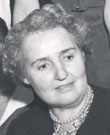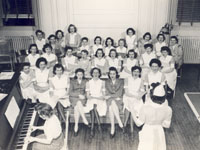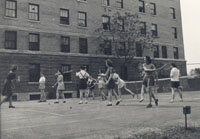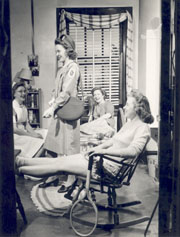In Her Words
“The Nursing School’s Responsibility in Admitting Students” by Louise Knapp, 1942
In the following, Louise Knapp, a 1920 graduate of the Washington University School of Nursing and its director from 1940 to 1961, writes of the responsibilities of a nursing school to its students. This speech was given at the 1942 American Nurses Association Biennial Convention in Chicago. She emphasizes that a School of Nursing must provide not only professional and clinical training but also extracurricular activities to best prepare able nurses and well-rounded individuals.
When a School of Nursing admits a student, it accepts the responsibility of giving her adequate preparation for her professional career. The School also carries responsibility in regard to patients cared for by the student. The student’s work must be in line with her preparation and experience, so that from the simple tasks she performs at first, to the complicated duties she performs as a senior, she works under supervision and at every level the patient’s comfort and safety are given thoughtful consideration.
A professional nurse can render more valuable professional service, if she is a happy, well-adjusted individual, with varied interests, some of them “outside” of her profession. The School should accept its responsibility for developing the integrated individual, with due emphasis on the professional training as well as on the “extracurricular” activities.
The lay groups can help immensely in developing the “non-professional” side of the nurse’s character.
In Washington University School of Nursing, volunteers have been helpful in extending our program for students’ recreation. Volunteers have taught dancing, have given bridge lessons, have coached the students interested in singing, and have given demonstrations in flower arrangement, and a charm class in “Design for Dressing,” or how to look your best. The students themselves arrange for a devotional hour once a week. We hope through these activities to give the students wider interests.
Students come to us with different backgrounds and experience. We wish to help them broaden their interests, and so try to present a variety of activities among which the nurse can choose. For example, we find some students who are shy, and who have never learned to dance, or who feel ill at ease or refuse invitations because they cannot play bridge. We believe that the student’s poise is improved when she is able to meet social situations without embarrassment. We want to give, in addition, individual counseling. At the present time, with the number of married students, we do find a more varied assortment of problems in the student group. We try to recognize the problems and to give help as needed.
Because the student renders service to patients, as a part of her education the School’s first responsibility is to select from the total list of applicants those who have potential characteristics of a good nurse. Many schools find that pre-entrance tests make this process of selection less of a gamble. It is possible to eliminate certain applicants because they lack the intelligence required to complete the class work satisfactorily, and to apply their theory in real situations. Other applicants may be eliminated because of obvious defects or health hazards. Still others seem to lack a strong interest in nursing, or mature judgment, or a steady purpose. The applicant’s interest in nursing and her determination to succeed are the hardest factors to measure – yet are perhaps the most important elements in her success or failure.
Today, the process of admitting students is even more complicated than formerly. Because of the shortage of nurses, we are urged to increase the schools by about one-third more students in the fall class. At the same time, we need better-qualified applicants for we need, more than ever before, a higher proportion of well-qualified leaders in nursing. We realize that in order to meet the new problems, we must admit intelligent young women with fine ideals, imagination, and good judgment to help the profession in its future development. For this reason in our efforts to increase the enrollment in Schools of Nursing, we need, particularly, college-trained women. They will find much to interest them in Nursing, and their contribution will safeguard present standards and will steer future developments.
The School, when it accepts a student, accepts also the responsibility to provide her with the type of professional education best suited to her needs. If she has had some previous college work, the School of Nursing should base its instruction on this foundation. In other words, she should not be given nursing classes on an inferior level. The plan for the student’s education will emphasize the professional aspects, but the development of the student as an individual must also be considered.
Nursing Service is based on nursing procedures, but good nursing includes an ability to help patients and their families to meet problems of sickness and to improve their health. In order to do this, we need a nurse with wide varied interests, who can meet and influence many different people. Most students in the School of Nursing need wise guidance for they differ in their emotions and in their backgrounds. An exuberant student needs to be curbed; a shy student needs encouragement.
In her professional life, a nurse finds that skill in cooking or sewing, a knowledge of history, an interest in current events, or memories of pleasant travels all may be helpful in securing the patient’s confidence and his cooperation in carrying out the specific health facts the nurse teaches.
We want the student to develop desirable standards, and good judgment. It is our theory that the nurse tends to copy the patterns of behavior she sees around her. Too often the student gets a confused picture of what is expected of her. We tell her that she must report every illness promptly to the Infirmary, for even a mild illness may be transmitted to patients under her care. This sounds reasonable, yet in an actual situation, a student who knows how busy everyone is on her division, hesitates to mention going off duty because she has a cold. Frankly, it takes a rare head nurse to appear sympathetic when the student mentions illness. I am afraid that the usual reaction may be irritation or annoyance. The student may, therefore, decide that next time it may be better to ignore her own illness. This brings us to another point – the responsibility of the School to secure and maintain a graduate group of faculty and staff nurses who show in their own attitudes and work, loyalty towards the institution, true consideration of the patient’s welfare, and an ability to assist the student in her professional development. The graduate nurse must have a desire to keep in touch with recent developments and procedures in the profession. Such a faculty will present to the student a pattern which she can follow, and which will help her to become a graduate nurse who makes us proud to include her in our profession.
In maintaining an adequate faculty for the School of Nursing, it is important to be sure that the working conditions are satisfactory. This implies adequate salary, desirable living conditions, and a teaching load that allows time to maintain high standards.
Still another responsibility which the School carries for the student is that in regard to her health. Because of the nature of nursing, the student is exposed to diseases and infections with which ordinarily she would have no contact. Most students suffer from a certain feeling of tension when on duty because of the serious responsibility they carry for the patient’s life and welfare. It is important, therefore, that the School have a definite plan for health supervision of the students. Outdoor recreation is recognized as an essential of normal existence, yet many students find it difficult to spend adequate amounts of time each day in these activities.
Still another need of the student, which many schools recognize, is that for a normal social life. Students enjoy dances and other social affairs. Since many students, however, come from smaller towns and only in small numbers from the larger cities, where our schools of nursing are located, the new student often finds that she has no friends when she first enters the school. In our School of Nursing, the Student Association tries to make the incoming students feel at home by appointment of a “Big Sister” for each new student. The “Big Sister” tries to explain the facilities of the neighborhood and the rules of the Nurses’ Residence, in a helpful way. They have even taken responsibility for an informal party in the Fall, for which they try to secure “dates” for all the “Little Sisters.”
In summarizing then, the School of Nursing accepts the following responsibility when admitting students. It plans to give that student a sound professional training, which will enable her to enter her preferred field as a graduate nurse. It should also assist in developing the student as an individual by discovering and developing special interests and abilities.
In order to accomplish these aims, the Schools needs a suitable environment for the students’ clinical experience where she can observe good service rendered to patients, and can copy such measures. She needs also to have a suitable environment in the Residence so that she can develop as a well-rounded individual, whose health is safeguarded and whose recreational and social needs are met.
Lay groups who are interested in the development of nursing, committee members and Boards of Trustees can be of immense help in carrying through a program for improving nursing education and through this, nursing service in the community. The lay groups know the needs of the community and can interpret them to the professional groups. There is, in addition, a real inspiration in the feeling that various groups and individuals in the community are working together to accomplish this important end, and that the professional group is not expected to shoulder the responsibility alone.
Related Links:
Return to Speeches, Essays & Narratives (In Her Words)
Return to In Her Words
Back to Top




